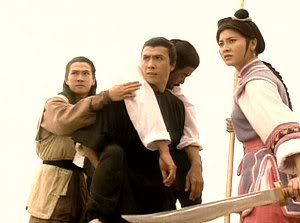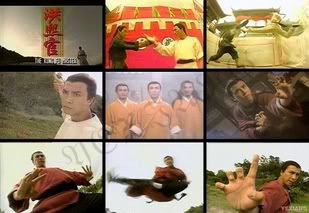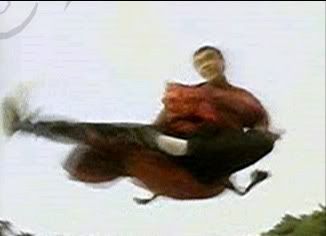
source: http://www.kungfucinema.com/reviews/revengeofthekungfumaster .htm
Revenge of the Kung Fu Master [TV] (1994)
AKA: Kung Fu Master Hung Hei Kwun; The Kung Fu Master II
Premise: The latter two-thirds of the truncated Kung Fu Master television series tells the story of how Han kung fu masters led by Hung Gar founder Hung Hei-kwun (Donnie Yen) emerge from the ashes of Southern Shaolin to fight Wu Dang master Pai Mei and the ruling Qing empire.
Review: Revenge of the Kung Fu Master is the latter two-thirds of a 30-hour ATV television series edited down to approximately six hours by Tai Seng and released on two separate two-disc DVD sets. This is one of the most ambitious and popular martial arts series ATV ever aired, second only to their follow-up, Fist of Fury. Donnie Yen (Iron Monkey, Hero) stars as the famed founder of Hung Gar, Hung Hei-kwun and acts as action director, while filmmaker Benny Chan (New Police Story) directs. This professional filmmaking talent, a large amount of traditional-style kung fu action, solid acting, and good production values for a Hong Kong TV series all make this show well worth taking the time to see, either in this edited and subtitled form or in the unedited and non-subtitled version available only on VCD.
The Kung Fu Master series is the story of Hung Hei-kwun, a legendary figure in kung fu lore who is responsible for the founding of Hung Gar kung fu which is practiced to this day. He was also a secular student of Shaolin and Ming patriot who joined the failed rebellion against the ruling Qing government. Revenge of the Kung Fu Master picks up with Hei-kwun and his friends Ko Chun-chung (Lawrence Yan) and Chi-gun entering Shaolin Temple in hopes of improving their kung fu and continuing their struggle against the Qing. Here they meet the mischievous Fong Sai-yuk (Nick Cheung Ka-fei) and Wu Wai-kin who sneaks in to steal a kung fu manual. After leaving Shaolin, they join Wing Chun founder Yim Wing-chun (Erica Choi) and Hei-kwun's father Ting-lam (Poon Chi-man) to resume their fight against the Qing and their allies from Wu Dang Mountain. Eventually, Chun-chung becomes a traitor who sides with the Qing, Wu Dang leader Pai Mei (White Brows) emerges to challenge both the rebels and the throne, and Shaolin Temple itself is threatened. With the help of his father, Hei-kwun struggles to combine his family kung fu style with his Shaolin teachings in order to create the Hung Fist technique and challenge Pai Mei and his traitorous friend.
This series should be of prime interest to anyone interested in kung fu folklore. It deals entirely with real Southern Chinese folk heroes, no doubt in circumstances exaggerated and warped by time and countless retellings, but fascinating nevertheless. Classic kung fu buffs will recognize the fight between Hung Hei-kwun and Pai Mei from Shaw Brothers' Executioners from Shaolin (1976). Fong Sai-yuk was made famous by Jet Li's portrayal in Fong Sai Yuk (1993) and its sequel, but this popular character has been around for years. Chang Cheh's Shaolin Temple (1976) features Sai-yuk as played by Alexander Fu Sheng and all the rest of the heroes who trained at the Southern Shaolin Temple before it was burned down. Li also played Hei-kwun in Wong Jing's oddball film The New Legend of Shaolin (1994).
As a television version of this legend, the series gets a dramatic boost while maintaining heavy action, although Tai Seng's compressed version omits a lot of the non-action scenes where character development occurs. Like The Kung Fu Master, Revenge feels a bit rushed and obviously has gaps. However, there is enough of the core story development to follow along. The main draw is the action, mostly choreographed by Donnie Yen. Power powder is overused and some of the sparring is chaotic, but Donnie gets good performances out of mostly non-martial arts stars who work primarily on TV productions. Donnie himself is in his prime and is in great form. As Bey Logan points out in his commentary, Donnie does a spectacular job of representing the Hung Gar style towards the series' end. A lot of the action mimics the style Donnie dealt with while working with Yuen Wo-ping on Iron Monkey and it's a testament to his skill that he is able to translate feature film-quality action to the small screen on a budget and with less time per action scene. Donnie also gets credit for delivering a solid acting performance, something he rare gets a chance to do in film. There is a powerful scene where he is forced to watch his internally-wounded father perform a series of kung fu movements, knowing full well that doing so will only worsen his condition.
A treat is seeing the character of Pai Mei, who comes across as a Wu Dang god with iron skin, unrivaled kung fu (until the Hung Gar style appears) and a look that could freeze the hearts of his enemies (figuratively). Lo Lieh is synonymous with the role, but the aged TV actor who portrays Pai Mei does a magnificent job. On the topic of Lo Lieh, this veteran actor also appears in the series as a Qing general. It's a minor, mostly non-action role, but it's always nice to see old screen legends of his stature at work.
As stated previously, the production values are good by ATV standards. Yet they are still poor by movie standards. Hairnets, hairpiece seams, and occasionally cheap-looking sets and costumes are impossible to ignore. The burning of Shaolin is underwhelming and the Beta camera work gives everything a slightly artificial look. Viewers should still cut the makers a little slack. A lot of time and effort still went into the production and its strengths which include an engaging plot, good acting from mostly TV actors and Donnie's choreography balance out the rough spots.
As their first attempt at editing a TV series, Tai Seng did a poor job with Fist of Fury, but they did much better with the previous Donnie Yen series. It's recommended that The Kung Fu Master be watched first, followed by Revenge of the Kung Fu Master. If there was only one kung fu TV series from Hong Kong to watch, this might be it. -
- Mark Pollard








 http://sgforums.com/?action=thread_display&thread_id=166315
http://sgforums.com/?action=thread_display&thread_id=166315





 http://sgforums.com/?action=thread_display&thread_id=166315
http://sgforums.com/?action=thread_display&thread_id=166315



 orh...okie.
orh...okie.